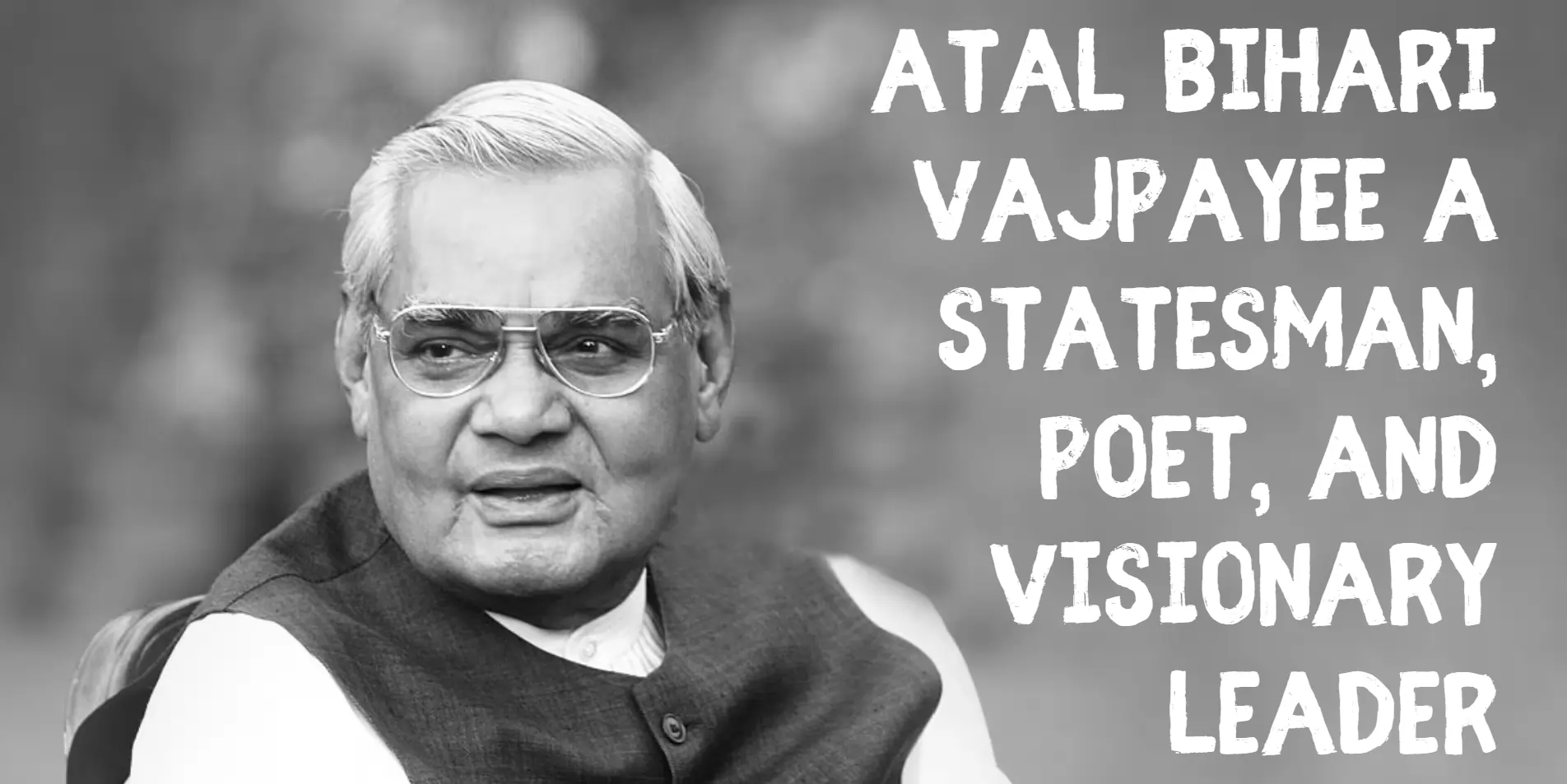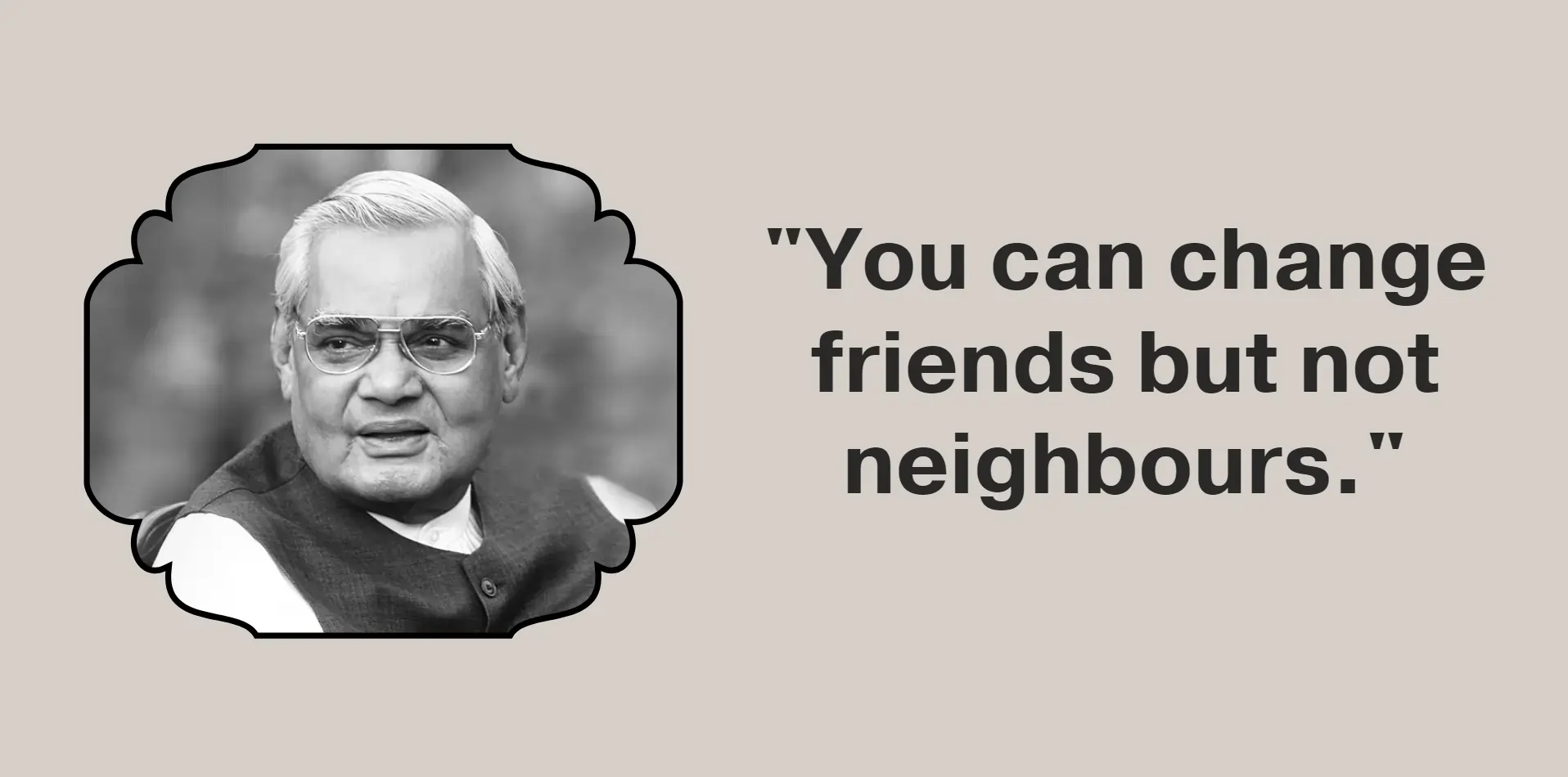
India has never seen a legacy quite like that of Atal Bihari Vajpayee, who was born on Dec. 25th, 1924, in Gwalior, Madhya Pradesh. Swearing as the 11th PM of India, he was exemplary leader, an eloquent speaker who was sincerely committed to democratic principles. So taking a view of Vajpayee’s political career from a young activist to a statesman one can appreciate the amount of commitment he has given and vision he has got for India.
Early Childhood and Political Emergence
Vajpayee joined the politics in his teens when he participated in the Quit India Movement in 1942. He later became one of the founders of the Bharatiya Jana Sangh (BJS) in 1951 which may be considered as his political career. He sought election twice in the 1950s; he fought for Lucknow, Mathura, and Balrampur in the 1957 Lok Sabha elections and emerged victorious only in Balrampur.
Rise to Prominence
After anti-Congress forces were united during the Emergency, he became a founding member of the Janata Party in 1977, demonstrating his capacity to adjust to the shifting political scene. Challenging Delhi, he emerged victorious, and was External Affairs Minister in the Morarji Desai ministry. The pragmatic Foreign policy was also defined during his time because the foundation of Indian diplomatic policy was laid during this time.
In 1980 Vajpayee and others of the BJS formed the Bharatiya Janata Party (BJP) for which he served as the first president. Vajpayee was very determined for the success of the party though he had some failures at the start of his political career such as in 1984 when he lost the Lok Sabha elections. BJP later became a strong political party.
Prime Ministerial Stints
So, it is very much pertinent to describe that Vajpayee is that political leader who assumed the office of the Prime Minister thrice in course of three different Lok Sabha terms. He served as Prime Minister – the first from BJP in 1996 – but for only 13 days because he could not muster a majority. He returned to power in 1998 with a coalition government that he continued to head until 2004. In his term, Vajpayee undertook several considerable changes for the Indian economy liberalization and infrastructure.
Visionary Leadership and Legacy
Mr Vajpayee was keen on both ideas of inclusion and democracy for the length of his leadership. He could speak and attract across the divide and garner support across parliamentary parties. His term also witnessed the successful nuclear tests in 1998 that declared India as a nuclear power state. There are strong reasons to believe that Vajpayee was serious about restoring the relations with Pakistan because he held the Lahore Summit in 1999.
Apart from the politics he was a great poet and writer. His writings, poems and essays have been working as collections that represent his powerful philosophical and patriotic vision. His eloquence and oratory skills endeared him to people across the nation, earning him the reputation of a statesman and a visionary leader.

His contribution to the Nation
Atal Bihari Vajpayee will be remembered as one of the greatest icons of India with his leadership quality his speech and his commitment to democracy. As the 11th Prime Minister of India he contributed towards different sectors like economy, infrastructure, foreign policy and social sector. He is still remembered and revered by generations of Indians.
Economic reforms and liberalization
He also presided over the Indian economy as Prime Minister and was the key to radical changes in the new economy of India. He supported initiating pacification in the Indian economy which in turn helped to introduce policies of liberalization, the liberalization of foreign investment, privatization, and the deregulation of policies in India. Under his heading India experienced economic liberalization and high average GDP growth rates, ranging from 6% to 8%. Vajpayee’s Government formulated a New Telecom Policy in 1999, through which the telecom revolution including the mobile phones in India was initiated.
Infrastructure Development
He was instrumental in bringing an impressive infrastructure odyssey. He initiated the much-publicized National Highways Development Project (NHDP), intended to transform infrastructure of road transportation in India. NHDP consists of the Golden Quadrilateral project which aims at establishing the straight high-quality highways connecting four metropolitan cities Delhi, Mumbai, Chennai and Kolkata. It further enhanced economic activities and trade across the country.
Foreign Policy and Diplomacy
Primarily, foreign policy of Vajpayee regime was pragmatic and pro-diplomatic, majorly aimed at a peaceful environment. He gave a great contribution to the Inter India relations mainly with Pakistan. In 1999 Vajpayee made a bus journey to Lahore, Pakistan to start peace process and to further cement the relationship between neighbouring countries. Despite the subsequent Kargil conflict, Vajpayee's efforts laid the groundwork for future diplomatic engagements.
The Vajpayee led government also carried out nuclear tests in 1998 that made India a nuclear weapon state. These tests attracted International backlash and sanctions but by dint of diplomacy Mr. Vajpayee manages India through these troubled time and sanctions was lifted in the long run. His leadership saw that India also upheld the policy of no first use with complete responsible nuclear posture.
Social Welfare and Inclusive Society
There was evidently an ethos of social justice with Vajpayee as he was first and foremost a liberal. His government also introduced several programs whose intention was to alleviate sufferings of the underprivileged. Prime Minister’s Rural Roads Scheme or PMGSY was launched to provide rural roads to connect the rural people with education, healthcare and markets and improve the rural economy. Sarva Shiksha Abhiyan SSA was an education program underneath process that sought the goal of Universal Elementary Education at least to all the youngsters of the Nation.
Vajpayee also planned health care when he started the National Health Policy in 2002 to increase health care sector and availability of health care services in India. His government launched the Antyodaya Anna Yojana (AAY), a food security programme which ensured food to millions of the country’s most economically insecure households.
However, Vajpayee’s success is not limited to political front; he was a poet as well as a writer. His collection of poems, as well as essays shows the generality of his philosophical disposition, and affinity to the country. The acknowledged leader Vajpayee was a master of utterance, people across the country loved to listen to him and considered him as one of them.
Pokhran-II Nuclear Tests
India has conducted series of five nuclear tests in May 1998, popularly known as Pokhran-II nuclear tests. These tests which were conducted in Thar desert of Rajasthan have established India into the club of nuclear weapon possessing countries. These tests were necessary to strengthen the national security and to create the potential threat of a response in case of necessary.
The response of the world organisation was equally quick and stringent when the tests were conducted. The United States, Japan and Canada reacted by threatening India with economic embargo, accusing India of violating international norms of non-proliferation. The sanctions targeted India's economy, aiming to pressure the country into rolling back its nuclear program.
Managing the Political Fallout
Indeed, Vajpayee did well in managing political consequences of Pokhran-II tests. He embarked on a diplomatic campaign around the world to explain India’s action and cushion the effects of the sanctions. It was Vajpayee who spoke for India’s security interest and used the nuclear factor to assert that India requires credible deterrence in a given regional setting.
One of the major points was made to assert that the non-proliferation regime is biased, and only a handful of countries have the right to possess nuclear weapons. He pointed out that the tests were undertaken by India in its national interest technically in order to deter any adverse action and to preserve independence.
Vajpayee had always been committed in the diplomatic front and proved so by visiting world leaders and international organizations. After much time and deliberation many countries came to appreciate India’s security concerns hence the ease on sanctions. Prime Minister Vajpayee, therefore, made sure that, at the end of the crisis, like any warrior, when Indians woke up, they were not just politically, but geopolitically strong and respected.
Measures to Rebuild Relations with Pakistan
However there was lot of tension after the nuclear tests and mostly Vajpayee wanted to build better relation with Pakistan. He was of the view that the stability and peace in South Asian region could only be maintained by talks. Subsequently, in February 1999, Vajpayee made another antic and took a bus ride to Lahore, Pakistan to express his party’s desire to run a friendly government with the neighbouring country.
The Lahore Summit where Vajpayee met with the Pakistani Prime Minister Nawaz Sharif resulted into Lahore Declaration. The provisions of this historic document include general principles of cooperation on bilateral disputes through council, with recourse to third party, cooperation in specific area and confidence Building measures. The declaration laid importance on nuclear actions and sour mutual recognition in regard to the sovereignty of the country.
The Kargil Conflict and Building the Diplomacy
But the optimism created after Lahore Summit was not for long lasting. The Kargil conflict started in May 1999 when Pakistani troops occupied dominating ground in Indian Territory in the Kargil district of the Indian administered area of Jammu and Kashmir. The conflict greatly pinches Vajpayee’s administrative strength as well as diplomacy as has been witnessed over and over.
Vajpayee’s government was quick to respond to the Kargil incursion, with armed force to capture back the territories. However, Vajpayee kept on the Pakistan on a diplomatic toe, while ensuring international sympathy for the right stand of India. The war drew to conclusion on India’s success to regain Kargil heights; however, it disturbed the relationship between India and Pakistan.
Nevertheless, Vajpayee went on supporting the policy of dialogue and peace. He had invited Pakistani President Pervez Musharraf to Agra Summit in 2001 to kick start the peace process. Despite no major development reached at the top level of the apex leaders, diplomatic effort seen in Vajpayee was never relenting.
As the prime minister of India and the leader of the opposition for most of the preceding decades, Atal Bihari Vajpayee’s contribution to the country consists of strength, strategic thinking and honest and unflinching commitment to the nation’s progress. His political career and strivings for Indian politics & economic liberalization, along with his diplomatic approaches are still celebrated in India. Vajpayee has left behind one of the most inspiring legacies of twentieth century statesmanship and poetry for the generations of Indians. His special way of performing his duties especially amidst the political systems needs to be upheld by other leaders.